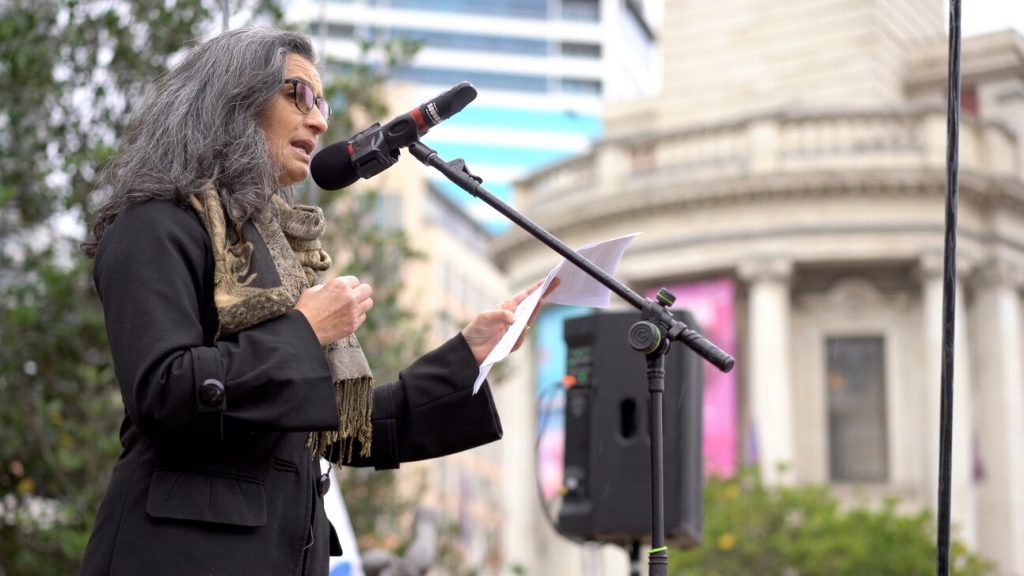Australia/Israel Review
AIR New Zealand: Fighting back
Jul 1, 2022 | Miriam Bell

Fervent anti-Israel rhetoric and propaganda have been hitting the headlines in New Zealand of late, and pro-Israel advocates are saying there is a need to step up the fight against them.
In mid-May, plans for “Nakba Day” commemorations in Wellington were dealt a blow by the city’s Mayor, Andy Foster. Originally, activists planned to light up a council-owned convention centre in the colours of the Palestinian flag.
Advice from the Ministry of Foreign Affairs and Trade prompted Foster to cancel the projection. This led to a “guerrilla projection” on the outside of the national museum, Te Papa, unsuccessful requests to meet Foster and a lot of sympathetic media coverage.
Then in June, the annual Doc Edge documentary film festival attracted the ire of Palestinian advocacy groups, who responded with a vocal boycott campaign by the Palestinian Solidarity Network (chaired by veteran anti-Israel activist John Minto) and the Palestinians in the Aotearoa Co-ordinating Committee.
It was not the first time the Academy Award-qualifying Doc Edge festival, which usually features several Israeli or Jewish-themed films, had been targeted. Back in 2018, the screening of a Ben-Gurion documentary resulted in Boycott, Divestment and Sanctions (BDS) movement threats and the disruption of screenings by activists armed with fake bombs.
On this occasion, it is claimed the boycott calls were due to the festival having the Israeli Embassy as one of its sponsors. But the activists focused their anger on the film that the Embassy was sponsoring, Dead Sea Guardians, about the efforts of a Palestinian, an Israeli and a Jordanian to save the Dead Sea.
Indigenous Coalition for Israel director Dr Sheree Trotter, who spearheaded a counter-campaign of support for the festival, said the film had been shown in many Arabic and European countries and it was only in New Zealand that a boycott had been called for.
“The ridiculous part about this is that the film promotes a message of co-operation and working together, accepting each other’s narratives and creating a new narrative, for the collaborative goal of saving the Dead Sea from drying out.”
None of this mattered to BDS activists, who did not care about the subject and were simply opposed to the festival receiving some funding from the Israeli Embassy, she said.
“Instead, they use intimidation techniques to pressure filmmakers to pull out of the festival, flooding in-boxes and social media platforms, publishing email addresses and encouraging others to bombard them.”
Trotter said she thinks the general public largely sees these activists as extremists, but the media gives them a free pass by providing them with uncritical publicity and publishing their propaganda without also providing a balanced or fair picture.
“In this way, many of the propaganda talking points get absorbed by the general populace, who may not have a strong view one way or another,” she said.
Zionist Federation of New Zealand President Rob Berg agreed the issue was that the pro-Palestinian lobby, which was actually a small group of vocal people who shouted loudly, seemed to be getting more media coverage, and that some in the press were making sweeping, judgemental statements in support of the lobby’s claims.
This was compounded by a growing media tendency to turn to a small, fringe group called Alternative Jewish Voices (AJV) for comment, he said.
“AJV is very unrepresentative of the wider Jewish community. Their sole identity as Jews seems to be the hate for Israel and Zionism, so this feeds into the increasingly widespread views of the political left. But AJV’s stance fits the anti-Israel narrative of certain publications.”
While most of the New Zealand public is not too interested in what is happening in Israel vis-á-vis the Palestinians, this year BDS activists felt more empowered, he said.
That was due to the false apartheid claims being touted by organisations such as Amnesty International, which for many decades had shown they suffer from institutional antisemitism. And the empowerment was evident in the protests about the Doc Edge festival and Wellington projection issue.
Berg and Trotter said their campaign to get people to support the festival had not been as successful as hoped, although reluctance around attending events due to COVID, along with memories of the 2018 bomb hoax, might also have contributed to the limited results.
They both argued there were additional actions supporters of Israel could, and should, take to better address the situation.
Berg said it was critical for people to actively counter the anti-Israel narrative. They could do this by writing to editors, engaging with people one on one, keeping updated on the situation in Israel, and writing letters of support to the management teams of organisations such as the Doc Edge Festival.
And Trotter says while the Palestinian lobby has few supporters in reality, those supporters have a lot of passion, commitment and determination to achieve their goals. “If Israel supporters had the same level of commitment, we could achieve a lot more,” she said.
Tags: Anti-Zionism, BDS, New Zealand






